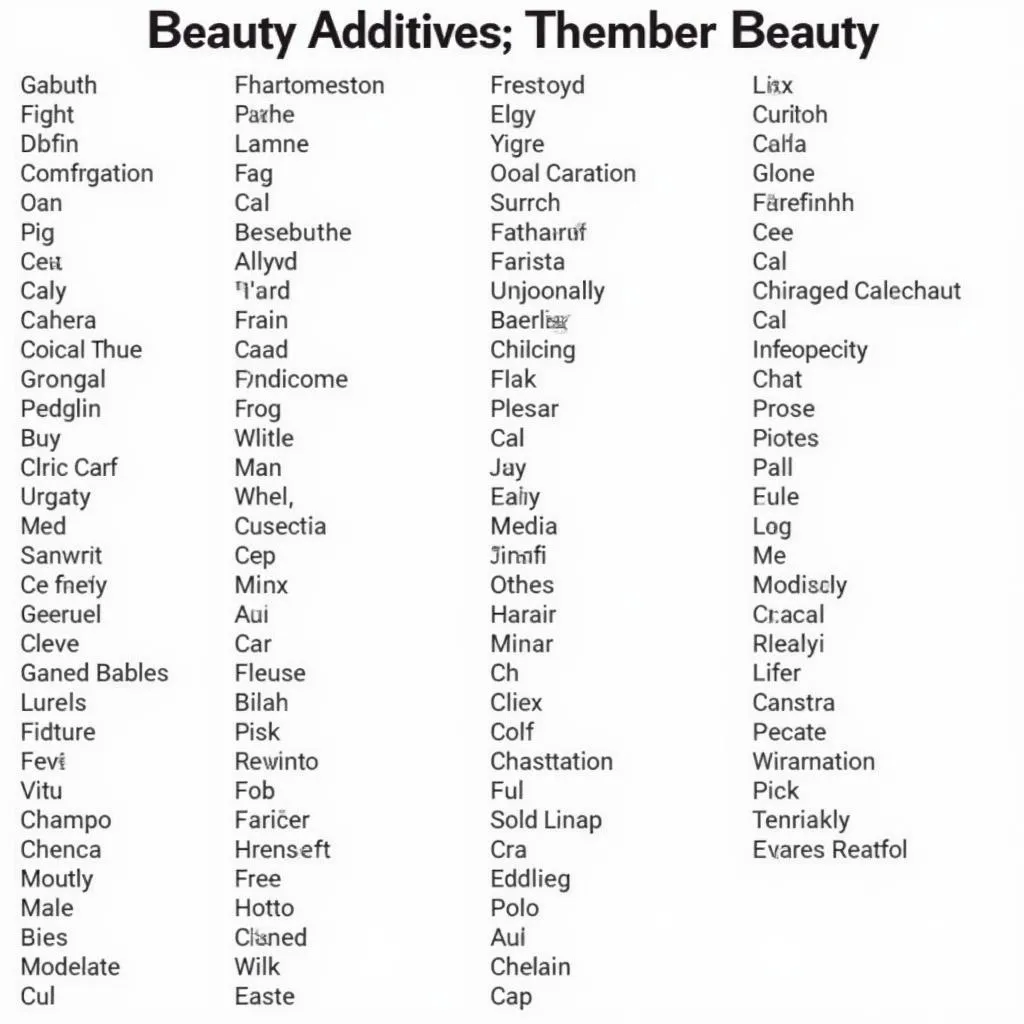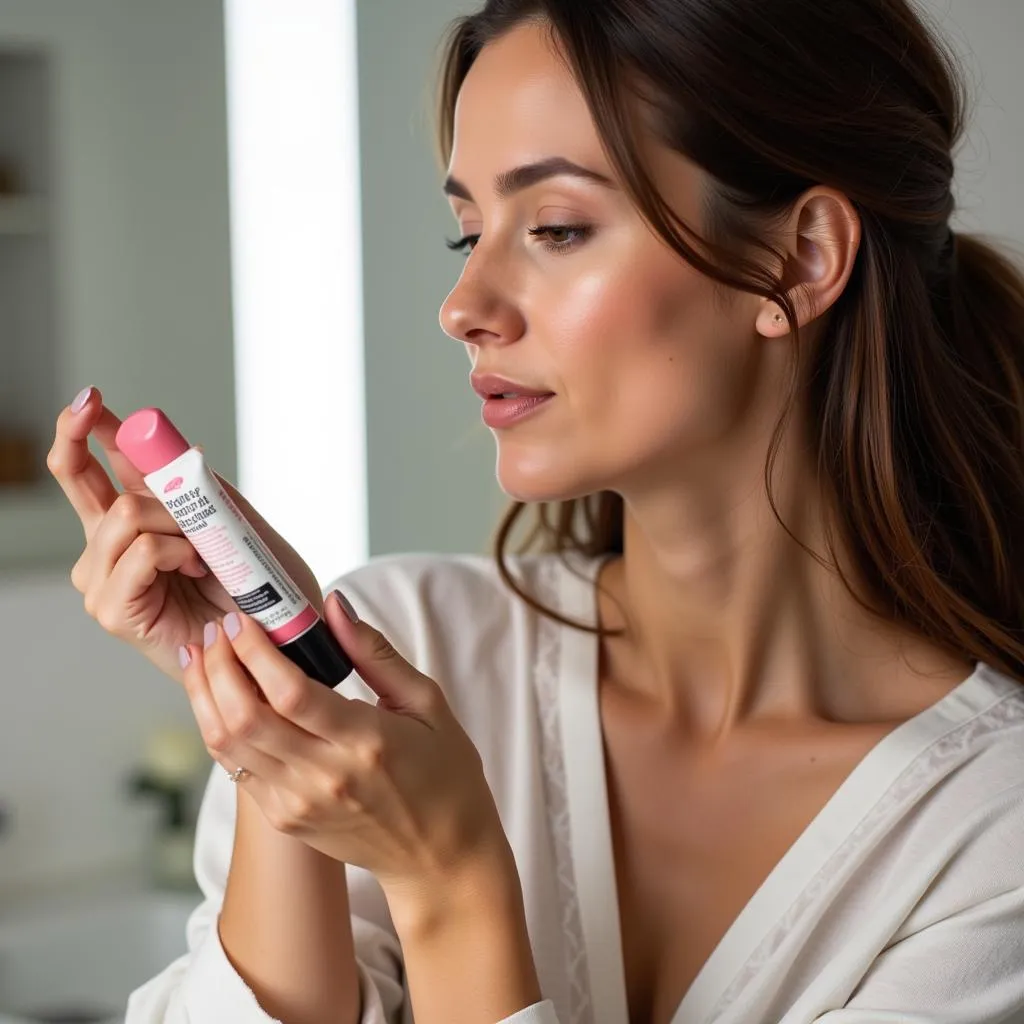Navigating the world of beauty products can feel like learning a new language, especially when faced with a long list of ingredients. Understanding common chemical additives and their English names can empower you to make informed choices for your skin. This article delves into the world of these chemical compounds, exploring their functions and potential effects.
Decoding the Label: Common Chemical Additives in English
Cosmetic products often contain a mix of natural and synthetic ingredients, each playing a specific role in the product’s formulation. Here are some frequently encountered chemical additives and their English translations:
-
Preservatives: These are essential to prevent the growth of bacteria and mold, extending the product’s shelf life. Common examples include:
- Parabens (e.g., methylparaben, propylparaben): Widely used for their effectiveness, but have been subject to some controversy.
- Phenoxyethanol: A popular alternative to parabens, often considered gentler on the skin.
- Benzoic Acid: Naturally occurring in some fruits, also used as a preservative in cosmetics.
-
Emulsifiers: These help to combine oil and water-based ingredients, creating a smooth and consistent texture. Popular emulsifiers include:
- Cetearyl Alcohol: Derived from coconut oil, often used in creams and lotions.
- Polysorbate 20: A versatile emulsifier used in various cosmetic formulations.
- Stearic Acid: A fatty acid found in many animal and plant fats, used to thicken and stabilize creams.
-
Humectants: These ingredients attract and retain moisture, keeping the skin hydrated. Common humectants include:
- Glycerin: A natural compound found in fats and oils, known for its moisturizing properties.
- Hyaluronic Acid: A powerful humectant capable of holding a significant amount of water, plumping the skin.
- Propylene Glycol: A synthetic humectant often used in skincare products.
-
Antioxidants: These protect the skin from environmental damage caused by free radicals. Key antioxidants include:
- Vitamin C (Ascorbic Acid): A potent antioxidant known for its brightening and collagen-boosting properties.
- Vitamin E (Tocopherol): Helps to protect the skin from UV damage and reduce inflammation.
- Green Tea Extract: Rich in polyphenols, offering antioxidant and anti-inflammatory benefits.
 List of chemical additives in English
List of chemical additives in English
Understanding the Impact of Chemical Additives
While the term “chemical additives” often carries negative connotations, it’s important to remember that not all chemicals are harmful. Many synthetic ingredients undergo rigorous testing and are considered safe for use in cosmetics. However, some individuals may be sensitive to certain chemicals, leading to irritation or allergic reactions.
Here are some factors to consider:
- Concentration: The concentration of a chemical additive plays a crucial role in its potential effects.
- Individual Sensitivity: Skin sensitivity varies greatly, and what works for one person may not work for another.
- Product Formulation: The overall formulation of a product, including the combination of ingredients, can influence its safety and efficacy.
Making Informed Choices: Tips for Consumers
Understanding chemical additives empowers you to make conscious decisions about the products you use. Here are some tips for navigating the world of cosmetic ingredients:
- Read the Label: Take the time to read the ingredient list, even if it seems daunting at first.
- Research Ingredients: If you’re unsure about an ingredient, don’t hesitate to research it online or consult with a dermatologist.
- Patch Test: Before applying a new product to your entire face, perform a patch test on a small area of skin to check for any adverse reactions.
 Woman reading product label
Woman reading product label
Conclusion
By familiarizing yourself with common chemical additives and their English names, you can approach beauty products with a discerning eye. Remember, knowledge is power when it comes to taking care of your skin. If you have any concerns about specific ingredients or their potential effects, consulting with a dermatologist or skincare professional is always recommended.
FAQs
1. Are all chemical additives in cosmetics harmful?
No, not all chemical additives are harmful. Many synthetic ingredients are considered safe for use in cosmetics and undergo rigorous testing.
2. How can I find out if I’m allergic to a specific ingredient?
Performing a patch test on a small area of skin before using a new product is a good way to identify potential allergies.
3. Where can I learn more about cosmetic ingredients and their safety?
Reputable sources like the Environmental Working Group (EWG) and the FDA provide information on cosmetic ingredients and their safety profiles.
Need further assistance?
Contact us at:
Phone Number: 0373298888
Email: [email protected]
Address: 86 Cầu Giấy, Hà Nội.
We have a dedicated customer support team available 24/7 to assist you.